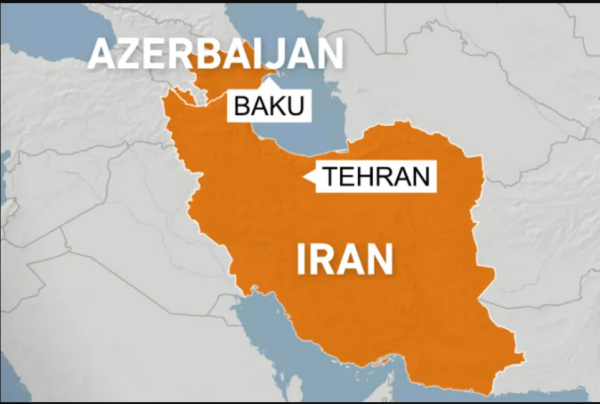In recent months, Iran and Azerbaijan have seen virtually weekly outbreaks of tension.
After Azerbaijan expelled four Iranian diplomats for unspecified “provocative conduct,” the Iranian Foreign Ministry vowed “reciprocal diplomatic measures” on Friday.
Iran warns that Azerbaijan-Israel relations pose a security concern.
Six Azerbaijanis were detained hours earlier for organizing a coup and being affiliated to Iranian secret services. Baku linked all suspects to Tehran.
As a man attacked the Azerbaijani embassy in the capital in late January, murdering its security chief and wounding others, President Ilham Aliyev, a strong supporter of Iran’s historical adversary Turkey, accused Tehran.
Iran stated diplomatic ties should stay unchanged because the assault was the act of a lone shooter with personal objectives, but Aliyev shuttered the embassy and decried the “terrorist” attack.
Azerbaijan also accuses Iran of supporting Armenia in the decades-long Nagorno-Karabakh war.
Iran, home to millions of Turkic-speaking ethnic Azerbaijanis, has long accused Azerbaijan of fostering separatism along its northern border.
Israel factor
Azerbaijan’s developing alliance with Israel may be Iran’s biggest grievance.
Last month, Israel and Azerbaijan’s top diplomats discussed “creating a single front” against Iran in a news conference, escalating Tehran’s warnings to Baku.
After Baku nominated its first ambassador to Israel, Foreign Minister Jeyhun Bayramov inaugurated the embassy in Tel Aviv.
Iran’s Foreign Ministry warned that this new strategy might threaten national security.
“The Muslims of the world would consider them collaborators of the Zionist dictatorship in the murder and atrocities against the oppressed Palestinians,” Iran’s parliament’s majority said of Azerbaijan’s stance.
War, perhaps?
Both Baku and Iran are showing their military muscles in blatant threats as tensions rise.
After the Nagorno-Karabakh war ended in 2020, Iran’s Islamic Revolutionary Guard Corps (IRGC) and army have undertaken multiple high-level exercises in the northwest and along the border with Azerbaijan to demonstrate ground and aviation capabilities.
The most significant was the IRGC’s first pontoon bridge over a stretch of the Aras river that defines parts of Iran and Azerbaijan’s lengthy border last October.
Days later, Iranian Foreign Minister Hossein Amirabdollahian inaugurated a consulate in Syunik, the southernmost Armenian region, to convey another direct message to Azerbaijan and Turkey.
The “Zangezur corridor” that Azerbaijan and Turkey want to build between Nakhchivan and the Azerbaijani mainland would cut off a vital Iranian transit connection to the South Caucasus and beyond.
Kaleji said the present escalation might lead to a cycle of de-escalation, like the last three decades of tensions between Iran and Baku.
“Although current tensions are quite serious, several variables preclude military war, including economic and commercial interdependence, transit routes between Iran, Azerbaijan, and Russia, and Azerbaijan’s dependency on Iran’s communication route to reach Nakhchivan,” he stated.
Notwithstanding the closure of the Tehran embassy, diplomatic lines remain open through the Azerbaijani consulate in Tabriz, the Iranian embassy in Baku, and the Nakhchivan consulate.
Kaleji suggests that Turkey and Russia, which is becoming closer to Iran following the Ukrainian war, may mediate as China is doing with Iran and Saudi Arabia.
“However, the fact is that Turkey and Russia, unlike Iran, do not have a threatening perception of Israel’s role in the Republic of Azerbaijan, the Zangezur corridor, and the threat of the common border between Iran and Armenia,” he said. The first step would be to understand those concerns and potentially follow up with joint regional talks.

